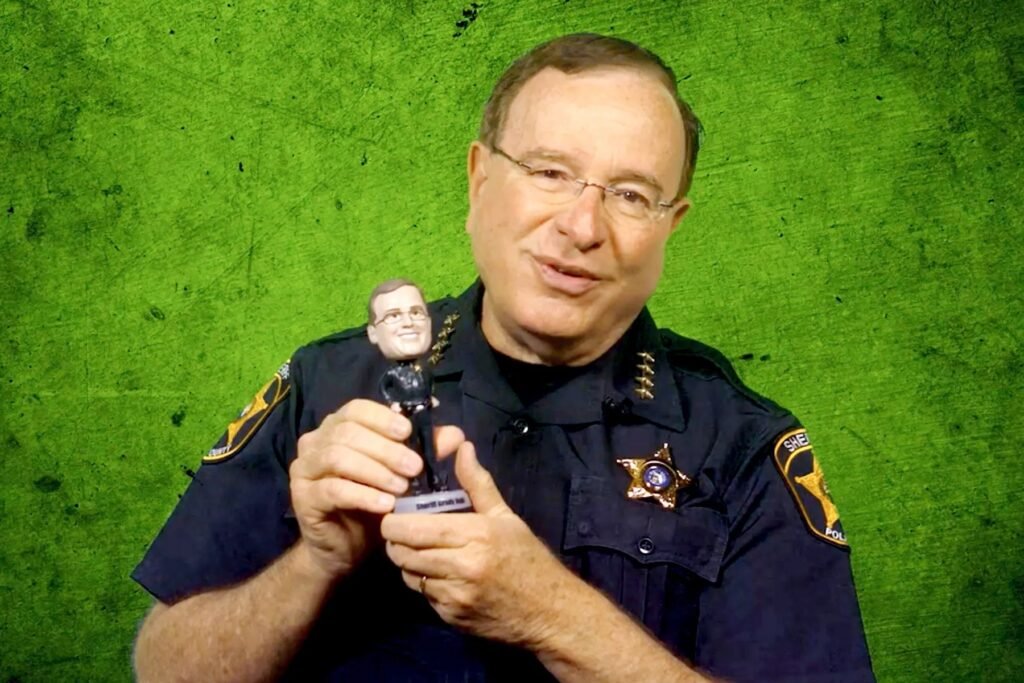Introduction to Grady Judd



Grady Judd, a prominent figure in law enforcement, has served as the sheriff of Polk County, Florida, since 2005. His career spans several decades during which he has gained recognition for his straightforward approach to law enforcement and his ability to communicate effectively with the public. Known for his witty and often humorous press conferences, he became a well-respected authority in the field, embodying the archetype of a no-nonsense sheriff dedicated to maintaining public safety. Judd’s reputation was bolstered by his commitment to transparency and community engagement, which endeared him to the residents of Polk County.
Transitioning from a purely law enforcement role, Grady Judd embraced the digital age by establishing a significant presence on social media platforms. Through these channels, he has shared updates on local crime, safety tips, and personal reflections, allowing him to engage with a wider audience and showcase his personality beyond the badge. This move has broadened his appeal, enticing both supporters and critics alike. However, as his online following grew, so did scrutiny regarding his statements and actions. In recent years, some observers have noted a disturbing shift in his public persona, suggesting a cognitive decline that has raised questions about his ability to fulfill his roles both as sheriff and public figure.
The following discussion will delve into the cognitive challenges that may have contributed to this transformation and how they reflect on his legacy. By examining Grady Judd’s journey from a respected lawman to a controversial figure in the public eye, we aim to understand the implications of his cognitive state and its impact on his communication and leadership abilities. This analysis seeks to provide a nuanced view of a man who has significantly influenced law enforcement and community relations in Florida.
Cognitive Decline: Indicators and Concerns

The discussion surrounding Grady Judd has increasingly shifted to observations of cognitive decline, raising concerns about his capacity to effectively serve the community. Recently, indicators have surfaced suggesting a deterioration in his ability to engage in lengthy and meaningful conversations. This alteration in his communicative abilities is troubling particularly for an individual in his position, where critical thinking and effective communication are essential components of public service.
In particular, the shift towards creating brief social media clips, which often lack depth, further emphasizes this concern. While social media can be an effective communication tool, the reliance on abbreviated exchanges may suggest a reluctance or inability to participate in more complex dialogues. Such tendencies could limit the public’s understanding of important issues, which is worrisome for a leader reliant on transparency and thorough explanations to foster community trust.
Moreover, cognitive decline is not merely a personal issue but one with widespread implications. For an influential figure like Grady Judd, potential lapses in judgment or decision-making processes could have significant consequences for the community he serves. The public relies on such individuals to address challenges competently and thoughtfully. Therefore, any indication of cognitive decline raises further questions regarding his readiness and fitness for duty.
As the conversation regarding Grady Judd evolves, it becomes increasingly critical to monitor these indicators closely. The community deserves to know that their leaders are equipped with the mental acuity necessary for effective governance. Therefore, addressing these cognitive concerns is essential not only for Judd’s personal wellbeing but also for the integrity of the public office he occupies.
Public Image vs. Reality: The Social Media Persona

Grady Judd, the well-known sheriff of Polk County, Florida, has built a substantial social media presence that significantly influences his public image. Utilizing platforms such as Facebook and Twitter, he effectively employs short videos to engage his audience, promote law enforcement initiatives, and showcase community involvement. These videos often highlight his humorous and approachable demeanor, crafting an image that resonates well with many constituents. However, the relationship between this carefully curated online persona and the realities of his professional conduct has raised questions about authenticity and ethical considerations.
While the social media persona of Grady Judd portrays an image of a light-hearted and community-focused law enforcement leader, it can be argued that this representation may overshadow critical aspects of his performance in office. For instance, his use of humor in the videos can sometimes detract from the gravity of the issues faced within the community, including crime and public safety concerns. The disconnect between his online engagement strategies and the serious challenges of his role as sheriff compels audiences to critically analyze the overall impact of his social media outreach.
Moreover, the ethical implications of public shaming cannot be overlooked in this context. Judd’s videos occasionally spotlight suspects or individuals embroiled in criminal activities in a manner that may seem punitive rather than educational. This approach raises important questions about the balance between accountability and compassion, particularly in cases where individuals may be struggling with addiction or other significant issues. As a public figure, Grady Judd’s responsibility extends beyond entertainment; it encompasses the need to foster a respectful dialogue about law enforcement and community relations. As such, the divergence between his public image and the complexities of his role invites a discussion on the broader impact of social media in shaping public perception of law enforcement leaders.
Misuse of Resources: Draining County and State Funds

Grady Judd, the long-serving sheriff of Polk County, has increasingly become a prominent figure in social media, engaging the public with his distinctive communication style. While his approach has garnered him considerable fame, it raises concerns regarding the allocation of vital resources. Critics argue that the emphasis on social media presence and public entertainment is detracting from essential law enforcement responsibilities, ultimately straining county and state resources.
One notable example is the perceived diversion of funds from community policing programs, which are crucial for fostering trust and cooperation between law enforcement and the communities they serve. By prioritizing media engagements and promotional content, critical initiatives designed to combat crime and enhance public safety may be left underfunded or improperly managed. For instance, resources that could have been allocated to hands-on crime prevention strategies might instead be used to maintain an active online presence, which does not contribute directly to the performance of essential policing duties.
Moreover, operational inefficiencies have emerged as a consequence of this focus on visibility over substance. The utilization of workforce and financial resources to produce content for social platforms diverts attention from the primary purpose of law enforcement. It is imperative that law enforcement agencies, including those led by Grady Judd, prioritize effective tactics for crime deterrence and community engagement, rather than fixating on viral moments or entertainment value. This tactic can lead to a misallocation of funds that could be better utilized in training, equipment acquisition, or community outreach programs.
As the public observes these developments, there is a growing concern about the long-term implications of such resource misuses. The potential for diminished effectiveness in law enforcement due to these actions poses serious questions about budget priorities and overall community safety in Polk County and beyond.
Behavioral Concerns: Influence and Public Bullying

The public persona of Grady Judd, the long-serving sheriff of Polk County, Florida, presents a complex mix of law enforcement professionalism and controversial behaviors. A notable concern that emerges from his public interactions is his aggressive stance against businesses and individuals he disapproves of. These confrontational attitudes can significantly impact local businesses and foster a culture of intimidation within the community. Grady Judd frequently uses his platform to express displeasure with specific establishments, and this public admonishment can lead to lasting consequences for those targeted.
Such behavior can be understood as a form of public bullying, where the sheriff uses his influence to portray dissenters negatively. By demonizing certain businesses, Judd’s approach can lead to a chilling effect, wherein other community members may hesitate to voice their opinions or support alternative establishments. This dynamic not only undermines free expression but also creates a toxic atmosphere that stifles constructive dialogue. Furthermore, the businesses that find themselves in Judd’s crosshairs may experience dwindling patronage, as the community may be swayed by the sheriff’s authoritative stance.
The ramifications of this form of public bullying extend beyond just economic fallout; they can ripple through the social fabric of the community. Businesses often serve as hubs for interaction and engagement among residents, and when these entities are publicly vilified, it can create divisions among citizens. Additionally, local morale may suffer, fostering an environment where fear overrides open discussion. The aggressive tactics employed by Grady Judd warrant a critical examination, as they call into question the ethics of utilizing one’s public office to exert influence over community sentiment. Understanding these behavioral concerns is essential to fostering a more supportive and constructive public discourse within the community.
Legacy Relationships: Connections with Criminal Elements
Grady Judd, the Sheriff of Polk County, Florida, has gained a reputation through various media outlets as a blunt and often entertaining figure in law enforcement. However, his longstanding relationships with certain criminal elements, particularly sex offenders, invite scrutiny over his credibility and decision-making. These associations can challenge public perceptions and raise significant concerns regarding the trustworthiness of law enforcement authorities.
The relationships that Sheriff Judd maintains with known sex offenders are particularly noteworthy, as they underscore potential conflicts in his judgment. Some critics argue that by engaging with individuals who have committed serious offenses, Judd may inadvertently compromise his role as a law enforcement leader. This raises alarm bells about the implications of such affiliations on his ability to maintain public safety and trust.
Drifting into potentially controversial territory, critics assert that these connections may reflect poorly on the moral and ethical compass guiding his leadership. If a figure like Grady Judd is associated with individuals convicted of sexual offenses, it potentially undermines the authority and integrity of the law enforcement institution he represents. Stakeholders, including the community and victim advocacy groups, often wonder whether such relationships could cloud his judgment regarding enforcement policies and strategies moving forward.
Furthermore, the transparency of these connections becomes a focal point in discussions about accountability in law enforcement. Should public figures like Judd maintain relationships with individuals who have histories of criminal behavior, especially those who belong to categories as sensitive as sex offenders? This question delves into the broader theme of integrity and the standards expected from those tasked with upholding the law and protecting the public.
The Community’s Role: Protecting Those Who Serve
Effective leadership in law enforcement is a critical pillar for community safety and trust. The role of public figures like Grady Judd extends beyond mere administration; they embody the values and ethics expected of law enforcement officers. Therefore, communities must actively engage in advocating for effective leadership that prioritizes accountability and transparency. Engaged citizens play an integral role in ensuring that the individuals who serve in law enforcement positions are not only capable but also aligned with the community’s expectations and standards.
It is essential for the public to remain vigilant in overseeing their leaders. This means adopting a proactive stance in questioning the practices of those in authority and demanding investigative measures when necessary. When community members notice issues in leadership, such as a shift in behavior, judgment, or adherence to ethical standards, it becomes their responsibility to voice concerns. This public scrutiny can drive officials, including figures like Grady Judd, to uphold the integrity of their responsibilities and foster a culture of accountability amongst their ranks.
Moreover, communities can participate in workshops, public forums, and advisory boards that focus on law enforcement policies and practices. By facilitating dialogue between the police and the public, citizens can ensure their voices are heard, promoting an atmosphere where leaders are encouraged to act in accordance with community values. The more transparent the communication becomes, the more likely the law enforcement agency will thrive in a manner befitting its public service obligation.
As the community embraces its role in protecting those who serve, it contributes significantly to creating an environment where officers feel supported and accountable. Together, communities and law enforcement can foster a sense of shared responsibility aimed at ensuring justice, safety, and ethical governance.
A Call for Investigation: The Case Against Grady Judd
The growing concerns regarding Grady Judd’s conduct as a public figure warrant a thorough investigation into his actions and behaviors. Throughout his tenure as Sheriff of Polk County, Judd has garnered considerable media attention, often celebrated for his candid comments and crime-fighting approach. However, recent incidents have raised questions about his ability to effectively serve the community and act in the best interests of the public. The mounting evidence points to a deterioration in his judgment and professionalism that cannot be overlooked.
One critical factor to consider is Judd’s increasingly controversial statements during press conferences. His remarks, which often walk a fine line between humor and insensitivity, have led to public outcry and allegations of inappropriateness. This shift in tone raises concerns about whether he is sufficiently mindful of the feelings of victims and their families. A public servant’s primary duty is to uphold community standards, but Judd’s recent behavior suggests a departure from this expectation.
Furthermore, allegations of mismanagement within the Sheriff’s Office hint at deeper systemic issues. Reports of inadequate training for deputies and failures in protocol can be directly linked back to a leadership style that seems more concerned with maintaining a media persona than fostering effective law enforcement. Such shortcomings hinder the office’s ability to ensure public safety and diminish the trust that citizens place in their elected officials.
Additionally, several incidents involving questionable actions by officers under Judd’s command prompt calls for accountability. Instances of excessive force and mishandling of evidence suggest that the Sheriff’s Office is not operating under the ethical standards expected of law enforcement agencies. As a prominent public figure, Grady Judd must be held accountable for the actions taken under his authority, as they ultimately reflect on his leadership.
Conclusion: The Future of Leadership in Law Enforcement
In reflecting upon the complexities surrounding public figures such as Grady Judd, it is imperative to acknowledge the multi-dimensional landscape of law enforcement leadership. This analysis has highlighted the critical areas of both impact and potential decline embedded in such high-profile roles. Grady Judd’s tenure has showcased the delicate balance leaders must strike between public perception and ethical obligations. As the scrutiny of law enforcement practices intensifies, the implications for future leaders are significant.
One of the core themes emerging from this discussion is the necessity for unwavering integrity and accountability within public service. As society evolves, so too does the expectation placed upon those who lead and serve within our communities. Law enforcement officers are not merely enforcers of the law; they are representatives of the community’s values and moral compass. Consequently, embracing transparency and ethical conduct will become increasingly crucial as demographics shift and public expectations rise.
A pivotal takeaway from the analysis of Grady Judd is the importance of adaptability in leadership. The challenges faced by law enforcement agencies require leaders to be not only reactive to issues but also proactive in shaping policy and practice. This entails engaging with the community and fostering trust, ensuring that the voices of the public are heard and considered in decision-making processes. Future law enforcement leaders must equip themselves with the skills to facilitate open dialogue and collaborative approaches to enhance community relations.
Ultimately, as the field of law enforcement continues to confront new challenges, it will be essential for emerging leaders to embody the principles of integrity and accountability. The legacy of leaders like Grady Judd serves as a reminder of both the responsibilities that accompany such positions and the profound impact they can have on societal trust and safety. In navigating this complex landscape, tomorrow’s leaders must remain steadfast in their commitment to serve with honor and respect, paving the way for a more just and equitable future.









